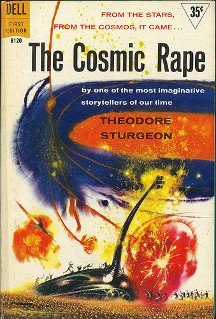
by Victoria Lucas
Ten days after my 21st birthday last October, a 13-day “crisis” began that got people wondering anew whether the world would end soon, if nuclear bombs would start falling. When the crisis (and not the world) ended, like others, I felt a sense of relief, but the Cold War wasn’t over, and it isn’t over now. It most certainly isn’t over in Walter Tevis’s novel of the near future, The Man Who Fell to Earth. A shadow of something big and ineluctable hangs over the book.

It is somewhat genre-bending, and I didn't recognize it as a work of science fiction when I started reading it. But the first clue was the starkness of the prose. The author has, as I understand it, been teaching English, but nevertheless it lacks a certain richness, contains a type of get-to-the-pointedness that I've come to associate with science fiction, even though I've read little of it. "Let's just gloss over that" description, embarrassing fact, indescribable circumstance, not draw too much attention to details that would take a long time to explain and have no relevance to the plot. "Just the facts, ma'am," as they say on Dragnet.
Of course my next clue was that, gradually, the main character, Thomas Jerome Newton, reveals that he is not from Planet Earth.

Tevis is the man who gave us "Minnesota Fats" and "Fast Eddie," the author of the 1959 book The Hustler, made into a film 2 years ago. That was his first novel, this his second.
This novel's characters answer the question: What if the aliens came (in this case only one) and H. G. Wells was right, disease was the cause of defeat, but it wasn't a physical disease in the same sense as the one that infected Wells's Martians, it was something that has been popularly regarded as a character flaw, as a funny stereotype? Like alcoholism. (Warning: There are no happy people in this book.)
I noticed that the catalog record shows "alcoholism" as a subject. I wondered at that until I had read to a certain point in this cautionary tale of the best laid plans of mice and aliens.
At first it is noted that Newton “had only recently begun drinking wine, pleased to find that it had, apparently, the same effect on him as it did on men of Earth.” But when he meets Betty Jo, a woman who takes him in when he breaks both legs in an elevator because the G forces are too much for him, he sees that she is fond of gin—a little too fond, in fact—and he begins to join her.
The first character to suspect that Newton is not human is Nathan Bryce, a college-level teacher of chemistry who quits to come to work for him, but "he smiled at himself, at the cheap, science-fiction level of his own private discourse. If Newton were a Martian or a Venusian, he should, by all rights, be importing heat rays to fry New York or planning to disintegrate Chicago, or carrying off young girls to underground caves for otherworldly sacrifices." Having taught at colleges, he would of course think of "science fiction" in this way because these are still common ideas among academics. This is Bryce’s opinion, but Tevis must have seen a lot of such themes preparing to write short stories such as his "The Ifth Of Oofth" in a 1957 issue of Galaxy Science Fiction.
Nevertheless, Bryce thinks Newton must be "either the world's most original inventive genius, or an extraterrestrial" and sets out to find out if his misgivings are true, in the process unconsciously undoing everything Newton has done toward his goal. By the time Newton visits Bryce in his apartment when “the Anthean” (as Newton’s people are called) is well along in his project, Bryce observes early in the evening that Newton "had already finished his first gin drink and had poured himself another. A drunken Martian? An extraterrestiral who drank gin and bitters?" It doesn't seem to occur to him that the "drunken Martian" has caught a fatal human disease, probably because Bryce himself drinks heavily on occasion. The expression “it’s all downhill from there” comes to mind.
I was intrigued by the fact that in several places, Newton's thoughts allude to his race and humans having the same origin, or previous visits to Earth by his people that jump-started human development of language and religion. My research indicates that there was a book in French published in 1960 by Louis Pauwels and Jacques Bergier (Les Matin des magiciens) that includes these ideas, but I have no indication that Tevis knows French. Another possibility is that Tevis read H. P. Lovecraft (B-r-r-r-r-r!), some of whose work reportedly has this theme.
Eventually, of course, we find out that Newton has come to the attention of the American government, despite hiding his project away in Kentucky (Tevis's home). While the CIA seems more interested in studying his nervous system and psychology to find out whether they can coddle or torture weapons information out of him, the person whom Newton considers his best friend on the planet (Bryce) wants him to save the humans.
Curiously, it never seems to occur to the humans to save themselves.

What holds us back? Tevis seems to me to put his finger on some factors restraining political problem solving. They are incarnate in the characters of the cynical Bryce, who is selfish, greedy, and apathetic; Newton’s patent lawyer and business agent, also afflicted with selfishness and greed; his woman friend Betty Jo, a female stereotype of unselfishness who drowns any intelligence she might have in booze; and the government agents—as cynical and lacking in compassion as Bryce—who would have no qualms about using any sort of world-destroying weaponry they might tease out of Newton on our fragile planet. A type of mental short-sightedness is endemic and finally culminates in Newton’s very real blindness that is nevertheless also symbolic.
Answering a question from Bryce about what he was trying to do, Newton says, “I was not at all certain what I was up to” because, although his project was to build a lifeboat to bring the surviving remnant of his people to Earth, “I’m not certain that my people will be able to stand your world." But he did become certain that they would have nothing to do here but "wait for the bombs to fall."
All in all, I found it a depressing book. But perhaps that’s only because, like Newton, I’m living under the shadow of the Cold War, and I take it seriously. So aside from those who are curious about what else the author of The Hustler wrote, or about a possible future around 15 years hence, or about how aliens or alcoholics are portrayed, I think I would recommend this to anyone in the future who wants to know what it felt like to live through (?I hope) the Cold War. The book has a few flaws, for which I would give it 3 out of 5 stars.








